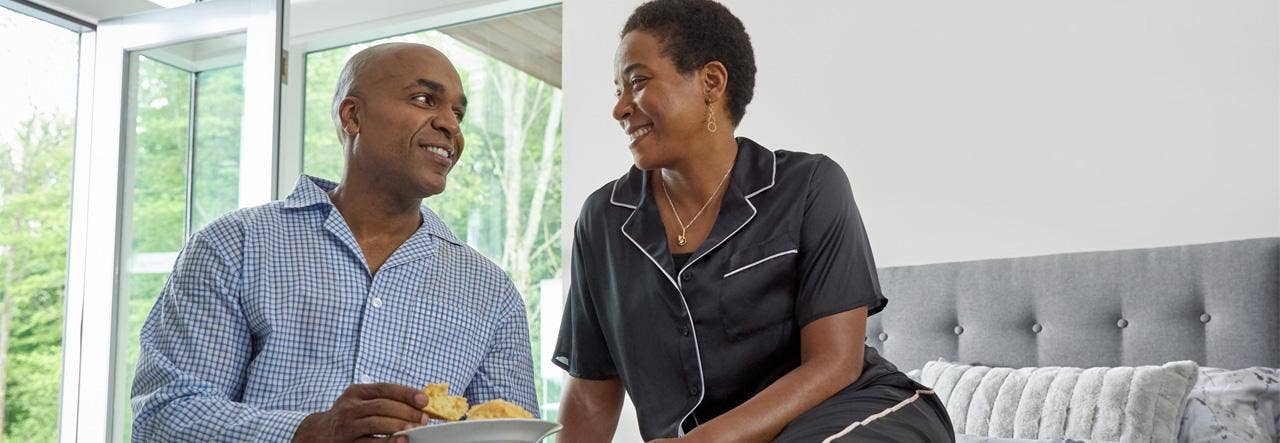In the 25 years we’ve been married, the decade we’ve spent mentoring and coaching other partnered relationships and parenting, and the number of TV shows/movies/books we’ve seen with a featured romance, my partner and I have come across a LOT of relationship and bedroom myths.
A lot, a lot, a lot of myths. In preparing to write this article, I asked my private coaching clients, group coaching clients, and our private social media groups for relationship and sex myths they encountered and ended up with a list of over 200.
Roses are red,
violets are blue.
There are probably romance myths
that you believe too.
Like most myths, relationship and bedroom myths are often steeped in cultural and historical reasoning. Society’s ideas surrounding romantic partnerships are a mix of social pressures, marketing, and our imaginations. Sometimes they were born out of a desperation to explain something or control the environment.
Myths like “put a knife under the bed to cut the pain of childbirth” came about from people wanting something, anything, that could lessen that particular “discomfort.” Attributing symbolism to the colors of flowers and what gifts have what meaning in a relationship has roots in faith practices and superstition. Some myths are hold-overs from old social structures of class and courtship. And more myths than any of us would like to admit are from the brilliant minds of marketing mad men.
Not all common relationship adages are baseless though. Some are sage advice for the majority of couples and are even backed by scientific evidence. The more we understand about human behavior, the more we can do to set up our partners and ourselves for success.
But What’s True and What Isn’t?
Untangling the myths from reality can be difficult and we may not even realize just how much our expectations and relationship practices are influenced by totally made-up concepts. If all your life, entertainment and marketing have sold you an idea that says, “this is what love is,” and you saw that idea reinforced by the expectations of people around you, how are you to know any different?
Every relationship is unique, but here is some myth busting and common relationship advice I’ve gathered during my years as a relationship coach and, well, as a human.
1. Never Go to Bed Angry


Surely sleep would come more easily if every day ended peacefully wrapped up in a nice little bow. The truth, of course, is that not only is this unrealistic, but also that trying to make it happen could cause more harm than good. Sometimes resolution takes more time than we have, sometimes we need some space to process, and sometimes being angry is actually the only reasonable and appropriate emotional response.
In relationships conflict is going to happen, and this will trigger anger. Working through those moments with kindness and respect and giving the process the time it requires is going to be far healthier than trying to force a resolution and ignore feelings in order to have things patched up before going to bed.
There is something to this myth though: don’t fight before bed. Doing so could flood your neural system with stimulating chemicals like cortisol and adrenaline, which can make sleep difficult. Plus, fatigue and lack of sleep make it harder to regulate oneself, meaning that if you fight when you’re already tired, you may forgo healthy conflict resolution skills and be more likely to say something you regret.
Studies show that lack of sleep intensifies angry feelings (seriously, “I wasn’t actually angry, I was just tired,” is the sleep deprivation version of hangry) and what is causing the conflict late at night may not be so much of an issue when you’re more rested. Tabling the conflict to revisit another time when both parties are rested will be more productive.
Caveat: of course, if it has already happened and you’re in a heated conflict with your romantic partner, now what? Admit that this isn’t a good idea and the timing may make resolution even more difficult. Pause the conflict long enough to set some boundaries for the moment, determine a goal, and agree to an end time with the option to revisit again later. Figuring out the purpose of the conflict will give you something to work toward together (common goal) without being embattled with each other (fighting). The limits may help keep you on task to be sure you still get a good night’s sleep.
2. Never Fight in the Bedroom


The idea behind this one is that if you fight in the space where you sleep and have sex, you’ll not be able to sleep or have sex without thinking about fighting. It most likely comes from the concept that you want your relaxing spaces to be associated with calm and quiet, your fun spaces associated with energy and excitement, and your eating spaces associated with pleasure and food. There is something to this but when it comes to relationships and the bedroom, what really matters is the way you fight, if you prioritize resolution, and if you address tension.
In other words, it’s how you fight that matters, not where.
If you don’t have anywhere else to safely and privately work through conflict, then doing so in the bedroom is more important than not doing so at all. As relationship coaches, my husband and I recommend finding a neutral space to address conflict and to do so with some kind of rules of engagement. While we wouldn’t recommend the bedroom first, if that’s the best option, then go for it. There are many different ways to handle conflict that will work as long as those involved are committed to doing so. Conflict can actually lead to even deeper connection, and it’s not a bad thing if that happens in the bedroom.
3. A Happy Couple Sleeps in the Same Room and Bed


This one has some evidence that it may be true as sleeping together does seem to be correlated with relationship and intimacy satisfaction.
BUT…
Correlation doesn’t mean causation and I’ve seen first hand how this may not always be true in a relationship. Relationships, like the people in them, are unique and even research isn’t one-size-fits all. In fact, there is research that shows that a partner with a sleep disorder may negatively impact their significant other if they sleep together in such a way that it may cause relationship difficulties (see Marital quality and the marital bed: Examining the covariation between relationship quality and sleep and Marital Happiness and Sleep Disturbances in a Multi-Ethnic Sample of Middle-Aged Women).
More times than I can count, I’ve heard from one partner frustrated by the rhythms of a symphonic bass section coming from their partner’s side of the bed. Two very happy couples I know well sleep in separate rooms due to one of the partners in the relationship moving wildly in their sleep, even violently. For relationships with a partner with a sleep disorder, happiness may in fact lie in different rooms.
For other couples who prefer to stay in close proximity, finding a customizable mattress can help. Mattresses like the EOS organic latex mattress from Naturepedic allow couples to customize the firmness on each side of the bed and can sometimes allow partners with different preferences to sleep beside each other more peacefully.


The research on this one is pretty solid: couples that go to bed together, are more connected and happier, have more sex, and overall rate their relationship satisfaction higher. (See more It’s More than Sex: Exploring the Dyadic Nature of Sleep and Implications for Health.)
Usually.
But not always.
Noticing a trend?
4. Go to Bed at the Same Time
Relationships just can’t be so cut and dried. There’s a lot of room for nuance and exceptions. Couples that are on different sleep rhythms, have opposite work schedules, require different amounts of alone time (and have different access to that), have sleep disorders that require different sleep spaces, etc., can be just as happy going to bed at different times as those that go to bed at the same time.
In relationship coaching the main encouragement my husband and I give is to just make sure that what you may miss out on by not going to bed at the same time (and studies show that it is pillow talk and physical intimacy) happens at other times. Being intentional to make the benefits of going to bed together happen even when you’re not interested or able to go to bed together is just as impactful.
Forcing something that doesn’t work for you simply because that’s how it is supposed to be is far more of a recipe for disaster such as growing resentment, disinterest, irritation, and contempt than not going to bed together could ever be.
5. Sexual Chemistry with your Partner is Forever


This one also translates to: sex will always be easy, spontaneous, and fulfilling. Oh boy. The greatest relationship myth out there is an effortless happily ever after – and that goes for sex too.
It’s fantastic when there is great chemistry and sex is easy, spontaneous, and fulfilling. That stage in any relationship is a lot of fun.
And usually temporary.
That doesn’t mean sex won’t be easy, spontaneous, or fulfilling ever again though. In our Sex After Baby education course, my husband and I talk about how sex is like seasons. Sometimes you’re in summer, sometimes fall, sometimes winter, and sometimes spring. We’ve talked with hundreds of couples and most have experienced that there’s often a cycle when it comes to libido and sex. Including ease, spontinaity, and sexual fulfillment. That’s true for relationships in general and particularly for physical intimacy. This cycle isn’t just related to having children, there are natural internal and external influences on this pattern. Everything from stress to hormones to health to work schedules to trauma can impact this rhythm.
While that may sound depressing, this is actually a very good thing in a romantic relationship. When sex doesn’t become the driving force for authentic connection in a relationship, an opportunity emerges for a deeper intimacy. One that if taken advantage of and fully invested in, ultimately usually gives way to even better sex.
Remember Context Matters
As with any advice, myths, or adages, context matters. Within the context of any given romantic relationship, there are circumstances to take into consideration and only those in the relationship are truly equipped to do so. Talking about possible concerns and evaluating expectations is how to avoid a myth becoming a self-fulfilling prophecy in your relationship. My husband and I have done a lot of things “wrong” in our relationship according to common relationship advice and we’re still happily connected, enjoying sex, and going to bed at different times. One thing we did right? Getting a customized bed with different levels of firmness … sleeping well really DOES help a relationship!
 BABY
BABY  KIDS
KIDS  ADULT
ADULT  LEARN
LEARN  STORES
STORES 
